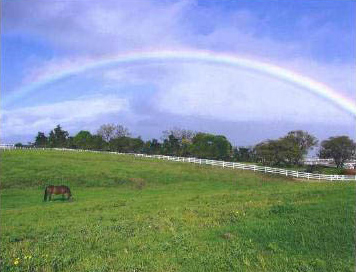The Natural State
Dear J: If the 'Natural State' is what lives in my heart of hearts, then I 'heartily' agree, because the Natural State is Total Contentment.
And quoting your excellent Bob O'Hearn quote: "...thus we sit in the unknown, as the unknown, and in the midst of the ashes of all our beliefs and ideas, a kind of sprout may push up, breaking through the dreamy fabric of our consciousness, a kind of awake-ness, and this awake-ness has no name, though people like to name, and so we have all the sutras and commentaries and whatnot, but at heart, it is really a very simple thing, the most simple thing there is, our original innocence."
I especially and literally note his 'at heart.' Our Natural State of Original Innocence is Total Contentment.
And quoting you: "Again, like the glowing luminescence of compassionate resonance that 'backflows' upon our own Presence. More commonly known as the 'joy of giving'..."
Yes, wonderful! Compassion for all suffering spontaneously arises in jhana absorption.
And quoting you again: "We do have many testaments of recent "Buddhas" who offer a differing view. I am clearly in their camp."
Have there really been more recent 'Buddhas'? I sure hope so, but such a distant hope! If there really was a Buddha living amongst us, wouldn't the impact of such a presence be felt more widely? If Buddha has followed Buddha upon the world stage since Siddartha, don't you think we as a life form would have evolved further?
I suppose you can argue that there always have been 'evolved' entities hidden away here and there. but I think we're way past the time for such privileged hierarchies and 'special cases,' yes? We're looking for an easy (Yes, easy, as Mama promised us), universally accessible, immediately enthralling and blissful way for the average Joe, between time-outs in the football game, to drop into his heart and stay there as permanently as possible. Of course you can say that Dzogchen points out the easiest path, and in a certain sense this is true. AS LONG AS the person has established themselves in a daily practice of some seriousness. But I'm after the 'basket cases' and 'impossibles,' as a friend of mine named some of the characters at our hippie communes. And for this reason I'm interested in very very easy initial entry exercises into bliss-soaked meditation, inasmuch as it's bliss that leads to relaxed one-pointedness.
When Ajahn Brahm describes various ways to keep one's attention on 'the beautiful breath' (such as thanking the trees and plants that make oxygen for you, and realizing how you make CO2 for them), I make a note of this suggestion to pass on to others.
And quoting you again: "Much of what you write about is definitely biased toward trying to experience some 'blissful' or 'pleasurable' experience. Experience is not Rigpa, even a fantastic and marvelous blissful and joyous state."
I think there are states of 'well-being' that have no opposite. More like Ken Wilber's 'stages' (levels) -- Archaic, Magic, Mythic, Mental, Pluralistic, Integral -- that once achieved, become permanent and include all the previous ones. States (experiences) never are permanent (gross, subtle, causal, nondual) and can be experienced on any stage. Thus a Nazi can achieve satori, and in Ken's view, 'Nazis' make up about 70 percent of our world population today, trapped on the enthnocentric (Mythic) level or lower. This is why it's so important that we find easy and immediately bliss-inducing exercises to haul these folks up a notch or three.
J writes: "Rigpa is THAT which experiences that blissful state. But to Rigpa, the experiences are all the same (suffering or pleasure)... just another reflection appearing in the mirror of our infinite experiences. We are the 'mirror' and the reflections that arise from us and within us as mirror, have no benefit whether pleasurable of painful. Rigpa neither seeks pleasure nor avoids pain and suffering."
Sounds a little Stoic... Since planetary living is made up of 'experiences,' and despite the fact that Rigpa is indifferent to both pleasure and pain, out of the depth of my compassion that also includes compassion for my 'horse,' Ego (mind), I will encourage those stages in my horse that bring joy and relief from suffering in the same way I would encourage the same for others, or I would wrap an ace bandage around a sore fetlock. I think an unrecognized puritanism has crept into some Buddhism that frowns upon so-called 'bliss bunnyhood' and tends to promote 'dry' insight instead -- sort of unfortunate, in my opinion, because this makes the ride a whole lot rougher – sort of like a vehicle in need of a lube job.
J writes: "As long as suffering exists, the heart of the Bodhisattva is fully engaged in relieving that pain in any and every way possible."
'The heart of the Bodhisattva.' Well said! And of course relieving the pain in one's own mind as well by dismounting from the mind, unsaddling it, and putting it out to graze 'in the fields of the Lord...'
Starting 'top-down' with the Dzogchen approach is of course very interesting for the advanced student who has spent years perfecting various meditation 'tools'. But for the vast majority of us, a step-by-step approach is more useful. For example, although one-pointedness - ekkagata - is mentioned frequently in various texts - it's only rarely that one reads that concentration - one-pointedness - is important to achieve because without it certain energy flows are blocked in the meridians. Once acquired, one can relax away from 'willing' it, and concentration remains.
There is a subtle 'bliss' energy that has no opposite because it's always there, beyond the dualities. For example, beyond the dualities of the in and out breath sensation' there is a more subtle energy sensation that is constant - the so-called 'subtle breath'. This all reminds me of a similar conversation I had in 1967 where I defended 'enlightenment' as 'sitting in your puddle of peace' to someone else's more nihilistic 'enlightenment as sitting in nothingness'. But how can you be sure you're not just 'nothinging out' if you did not get there on the jhana elevator? Even the Buddha says:
"There is no Jhana without wisdom
There is no wisdom without Jhana
But for one with both Jhana and wisdom
They are in the presence of Nibbana."
The bottom line on bliss for me is that the bliss that arises from deeper and deeper lettings-go is not coming from attachment. Yee haw! And the much-touted Relaxation Response is more than just 'no suffering reporting in.' I think true relaxation - letting go - is an immersion in a bubbly bath of happy heart energies.
(off to feed my horse Ego a carrot)
On second thought, I'll end with a little more Ajahn Brahm from his essay, "The Bliss of Letting Go," that I think bridges J's and my views:
http://www.what-buddha-taught.net/Books/Ajahn_Brahm_Bliss_of_Letting_GO.htm
"... a meditator who has familiarity with Jhanas will recognise them as blissful states of letting go, and it is right there, in the experience of letting go, letting go, that the relevance of Jhana is known. The First Jhana is the natural result of letting go of the concern for sensory pleasure (Kama Sukha), by which is meant all concern, even for mere comfort, in the realm of the five external senses (sight, sound, smell, taste and touch). In the First Jhana, through sustained and complete removal of all interest in these five senses the meditator loses all sense of the body, and these five external senses disappear. They abide wholly in the sixth sense that is pure mind, and are still, in blissful inner silence. The Buddha called this "The Bliss of Renunciation", or the bliss of letting go. The Second Jhana is the natural result of abandoning a very subtle movement of attention towards and holding onto this blissful mind object. When this final 'wobbling' of attention is let go of, one experiences the even more pleasurable bliss of full inner stillness (Samadhi), where the mind is absolutely one-pointed and motionless. The Third Jhana is the natural result of letting go of the subtle excitement of rapture, and the Fourth Jhana is the natural result of letting go of happiness itself, so as to enjoy the most profound and immovable mental equanimity.
>" In Buddhism, experience, not speculation, and even less blind belief, is the criterion for understanding. A meditator simply does not realise what stillness, rapture, happiness or equanimity fully mean until they have become familiar with the Jhanas. But the experience of the Jhanas, these stages of letting go, give one direct understanding through experience of these mental phenomena, in particular happiness (Sukha) and suffering (Dukkha)."
I'll have mine over-easy with a sprinkle of Amrita, thanks!



